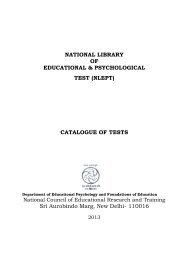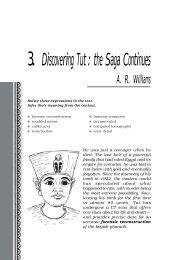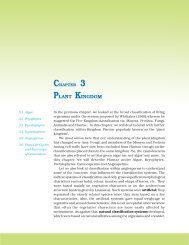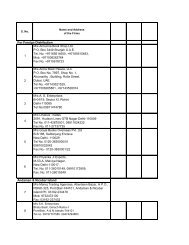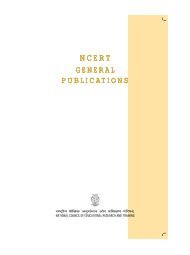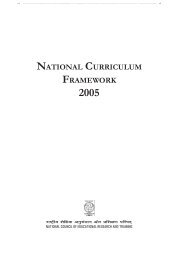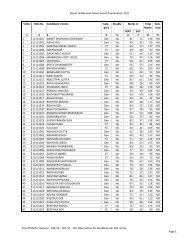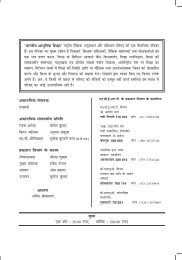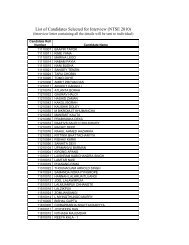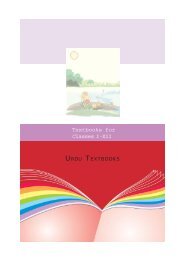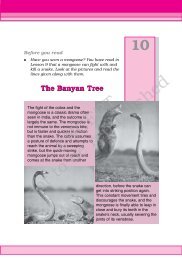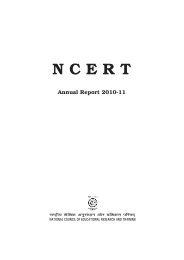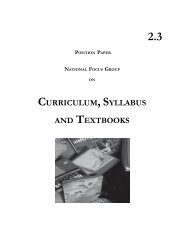indian education - National Council Of Educational Research And ...
indian education - National Council Of Educational Research And ...
indian education - National Council Of Educational Research And ...
Create successful ePaper yourself
Turn your PDF publications into a flip-book with our unique Google optimized e-Paper software.
The Aims of Education 11<br />
Some Implications for Pedagogy and<br />
Evaluation<br />
It may be useful to consider some of the<br />
implications of what has been said so far<br />
for pedagogy and evaluation. The<br />
strangeness of the school environment<br />
can be mitigated by imaginatively linking<br />
the experience of school with the child’s<br />
experience outside it in the community.<br />
While school might have many new and<br />
exciting experiences for the child, it must<br />
not appear as rejecting or eve ignoring<br />
the child’s experience in the community.<br />
Pedagogy will gain but incorporating<br />
children’s experience of what the Greeks<br />
used to call oikos, and likewise and it can<br />
teach them fresh ways of experiencing<br />
the world outside the school. For<br />
example, if a child has grown up in<br />
intimate contact with the nature around<br />
him, as most children in tribal<br />
communities do, school can enrich and<br />
enhance this intimacy by sharpening<br />
the child’s awareness of his own natural<br />
environment–something that sadly does<br />
not happen in most of our schools. The<br />
role of the teacher here is absolutely<br />
crucial. One is reminded of the nineteenyear-old<br />
teacher who came to help Tagore<br />
with the teaching in his school:<br />
With him boys never felt that they<br />
were confined in the limit of a teaching<br />
class; they seemed to have their access<br />
to everywhere. They would go with him<br />
to the forest when in the spring the sal<br />
trees were in full blossom and he would<br />
recite to them his favorite poems, frenzied<br />
with excitement…He never had the feeling<br />
of distrust for the boys’ capacity of<br />
understanding …. He knew that it was not<br />
at all necessary for the boys to<br />
understand literally and accurately, but<br />
that their minds should be roused, and<br />
in this he was always successful he was<br />
not like other teachers, a mere vehicle of<br />
textbooks. He made his teaching<br />
personal, he himself was the source of<br />
it, and therefore it was made of life stuff,<br />
easily assimilable by the living human<br />
nature.” 3<br />
Pedagogy must draw upon resources<br />
of creativity and exploration, such as<br />
literature in its various forms and history<br />
in its uncovering modes, e.g., unmasking<br />
the mind of the colonisers as well as that<br />
of the colonised. It is important to<br />
establish connections between<br />
apparently discrete events and things,<br />
between things and events close to one<br />
and those distant in time and space–<br />
connections which can bring sudden<br />
light to the workings of the child’s own<br />
mind.<br />
If the world of <strong>education</strong> is, in a<br />
sense, moral <strong>education</strong>, and if means<br />
and ends in moral matters are<br />
organically or internally connected, the<br />
teacher, who is the primary vehicle of<br />
<strong>education</strong>, must be seen substantially as<br />
an embodiment of virtues in his role as<br />
a teacher.<br />
Teaching should be in the<br />
conversational mode rather than in the<br />
mode of authoritarian monologue. It is<br />
in the conversational mode that the child<br />
is likely to grow in self-confidence and<br />
self-awareness and will more easily<br />
establish connections between the<br />
3 Tagore, Rabindranath 1996. My School. In Sisir Kumar Das (ed.) English Writings of Tagore,<br />
Vol. II. Sahitya Academy.



